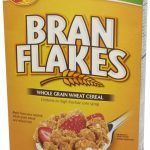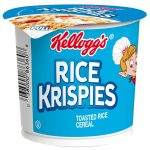Discover The Gluten-Free Goodness Of Honey Comb Cereal – Go For A Healthy And Tasty Treat Today!
Is Honey Comb Cereal Gluten Free?
Introduction
Greetings, Cereal Enthusiast! Today, we delve into the world of breakfast cereals to answer an important question: Is Honey Comb Cereal gluten-free? As more and more people adopt gluten-free diets due to allergies, intolerances, or personal preferences, it’s crucial to understand the gluten content in popular cereals. In this article, we will explore the ingredients of Honey Comb Cereal, discuss its gluten-free status, and provide you with all the information you need to make an informed decision. So, let’s dive in!
What is Honey Comb Cereal?
Honey Comb Cereal is a beloved breakfast cereal that has been a staple in many households for decades. Its distinctive honeycomb-shaped pieces are both visually appealing and delicious, making it a popular choice among cereal lovers of all ages. Made primarily from cornmeal, Honey Comb Cereal offers a sweet and crunchy experience that many find irresistible.
1 Picture Gallery: Discover The Gluten-Free Goodness Of Honey Comb Cereal – Go For A Healthy And Tasty Treat Today!

The Ingredients
Honey Comb Cereal is made from a combination of cornmeal, sugar, corn syrup, and honey. It also contains various artificial flavors and colors to enhance its taste and appearance. However, the key question remains: Does this cereal contain gluten?
Is Honey Comb Cereal Gluten Free?
🔎 Let’s get straight to the point – Honey Comb Cereal is not gluten-free. While cornmeal is naturally gluten-free, the other ingredients in Honey Comb Cereal, such as the artificial flavors and colors, may contain trace amounts of gluten due to cross-contamination during manufacturing processes. Therefore, individuals with gluten allergies or sensitivities should exercise caution and avoid consuming this cereal.
What is Gluten?

Image Source: cerealsecrets.com
Gluten is a mixture of proteins found in wheat, barley, rye, and triticale. It gives dough its elasticity and helps baked goods maintain their shape. However, gluten can cause adverse reactions in individuals with celiac disease, gluten intolerance, or sensitivity. That’s why it’s crucial for them to identify gluten-containing products and opt for gluten-free alternatives.
Alternatives to Honey Comb Cereal
If you need a gluten-free breakfast cereal, there are several delicious alternatives available on the market. Popular options include rice-based cereals, corn flakes, gluten-free oats, and various other grain-free options. Always remember to check the labels for gluten-free certifications to ensure that the cereal meets your dietary requirements.
Who Should Avoid Honey Comb Cereal?
🚫 Individuals with celiac disease or gluten intolerance should avoid consuming Honey Comb Cereal due to its gluten content. Even though the cereal itself is not made from gluten-containing grains, potential cross-contamination during production poses a risk. It is always wise to err on the side of caution to prevent adverse reactions and protect your health.
Celiac Disease
Celiac disease is an autoimmune disorder that affects the small intestine. When individuals with celiac disease consume gluten, their immune system reacts by damaging the lining of the small intestine, leading to various symptoms and long-term complications. It is estimated that 1 in every 100 people worldwide has celiac disease.
Gluten Intolerance
Gluten intolerance, also known as non-celiac gluten sensitivity, is a condition that causes adverse symptoms similar to those of celiac disease. However, it does not involve the immune system attacking the small intestine. People with gluten intolerance experience symptoms such as bloating, abdominal pain, diarrhea, and fatigue after consuming gluten.
When to Avoid Honey Comb Cereal?
🕒 If you have celiac disease, gluten intolerance, or are following a strict gluten-free diet, it is advisable to avoid Honey Comb Cereal at all times. Even if you don’t have any gluten-related conditions, it’s essential to be aware of the ingredients in your food and make informed choices based on your dietary needs and preferences.
Reading Food Labels
When purchasing any food product, including breakfast cereals, it’s crucial to read the labels carefully. Look for any mention of gluten-containing ingredients or possible cross-contamination warnings. Many manufacturers now provide clear labeling to help consumers identify gluten-free products easily.
Where to Find Gluten-Free Cereal?
🌍 Nowadays, gluten-free cereals are widely available in most grocery stores and supermarkets. Dedicated gluten-free sections or health food aisles often stock a variety of options. Additionally, many online retailers offer a wide selection of gluten-free cereals, allowing you to conveniently shop from the comfort of your home.
Specialty Stores
Specialty stores or health food stores are excellent places to find a diverse range of gluten-free cereals. These establishments typically offer a wide selection of products specifically catered to individuals with dietary restrictions or preferences.
Online Retailers
Online retailers provide a convenient platform to explore and purchase gluten-free cereals. With just a few clicks, you can have your favorite gluten-free cereals delivered straight to your doorstep. Remember to check customer reviews and ratings to ensure the quality and reliability of the products before making a purchase.
Why Should You Consider a Gluten-Free Diet?
❓ Many people choose to adopt a gluten-free diet for various reasons. While it is essential to consult with a healthcare professional or registered dietitian before making any significant dietary changes, here are a few potential benefits of a gluten-free diet:
Managing Celiac Disease or Gluten Intolerance
For individuals with celiac disease or gluten intolerance, a gluten-free diet is the only effective treatment. By eliminating gluten from their diet, they can alleviate symptoms, reduce the risk of complications, and improve their overall health and well-being.
Weight Management
Some individuals find that adopting a gluten-free diet helps them manage their weight effectively. This may be due to the elimination of certain processed foods that contain gluten, which are often high in calories and low in nutritional value.
Improved Digestive Health
For individuals with gluten sensitivities or digestive issues, a gluten-free diet can help improve their digestive health. Removing gluten from the diet may reduce bloating, gas, and other discomfort associated with gluten consumption.
How to Follow a Gluten-Free Diet?
🥗 Following a gluten-free diet requires careful planning and attention to detail. Here are a few tips to help you navigate the world of gluten-free eating:
Read Labels
When shopping for groceries, read labels thoroughly to identify any gluten-containing ingredients or possible cross-contamination risks. Familiarize yourself with terms that indicate the presence of gluten, such as wheat, barley, rye, and malt.
Opt for Naturally Gluten-Free Foods
There are several naturally gluten-free foods that you can enjoy without worry. Fresh fruits and vegetables, lean meats, fish, eggs, dairy products, legumes, and gluten-free grains like rice and quinoa are all excellent options.
Explore Gluten-Free Alternatives
Fortunately, there is a wide variety of gluten-free alternatives available for almost every type of food. From pasta and bread to cookies and cakes, you can find gluten-free versions of your favorite treats at specialty stores or even make them at home using gluten-free flours.
Pros and Cons of Honey Comb Cereal
👍👎 Like any food product, Honey Comb Cereal has its advantages and disadvantages. Let’s take a look at the pros and cons:
Advantages of Honey Comb Cereal
1️⃣ Delicious and Crunchy: Honey Comb Cereal offers a unique and enjoyable texture that many find satisfying.
2️⃣ Quick and Convenient: It is a ready-to-eat cereal that requires no preparation, making it a convenient choice for busy mornings.
3️⃣ Source of Carbohydrates: Honey Comb Cereal provides a quick source of energy due to its carbohydrate content.
Disadvantages of Honey Comb Cereal
1️⃣ Contains Gluten: Honey Comb Cereal is not gluten-free, which limits its consumption for individuals with gluten allergies or intolerances.
2️⃣ High Sugar Content: Like many sweetened cereals, Honey Comb Cereal contains a significant amount of sugar, which may not be suitable for those watching their sugar intake.
3️⃣ Limited Nutritional Value: While Honey Comb Cereal can be part of a balanced diet, it is not a significant source of essential nutrients. Pairing it with nutritious additions like fruits, nuts, or yogurt can help enhance its nutritional profile.
Frequently Asked Questions (FAQs)
Q1: Can I eat Honey Comb Cereal if I have a gluten sensitivity?
A1: It is advisable to avoid Honey Comb Cereal if you have a gluten sensitivity, as it contains potential sources of gluten due to cross-contamination during manufacturing.
Q2: Does Honey Comb Cereal have any gluten-free alternatives?
A2: Yes, there are various gluten-free cereals available in the market that can be a suitable alternative to Honey Comb Cereal for individuals following a gluten-free diet.
Q3: Can children with gluten allergies consume Honey Comb Cereal?
A3: It is best to consult with a pediatrician or healthcare professional before introducing Honey Comb Cereal or any gluten-containing product to children with gluten allergies.
Q4: Are there any potential side effects of consuming Honey Comb Cereal for individuals with gluten sensitivities?
A4: Individuals with gluten sensitivities may experience symptoms such as bloating, gas, diarrhea, or fatigue after consuming Honey Comb Cereal due to its gluten content.
Q5: Can I enjoy Honey Comb Cereal as an occasional treat?
A5: If you do not have any gluten-related conditions and enjoy the taste of Honey Comb Cereal, you can include it in your diet as an occasional treat. However, moderation is key, considering its sugar content.
Conclusion
In conclusion, Honey Comb Cereal is not gluten-free and should be avoided by individuals with celiac disease, gluten intolerance, or those on a strict gluten-free diet. While it offers a delightful taste and convenient breakfast option, it’s crucial to prioritize your health and make informed choices based on your dietary needs. Explore the wide range of gluten-free cereals available and enjoy a delicious and nourishing breakfast that suits your lifestyle. Remember, a well-balanced diet is the key to a healthy start to your day!
Final Remarks
Disclaimer: The information provided in this article is for educational and informational purposes only. It should not be considered as a substitute for professional medical advice, diagnosis, or treatment. Always seek the advice of your physician or other qualified healthcare providers regarding any medical condition or dietary restrictions you may have. The author and website are not responsible for any consequences that may arise from following the information provided in this article.
This post topic: Cereal



